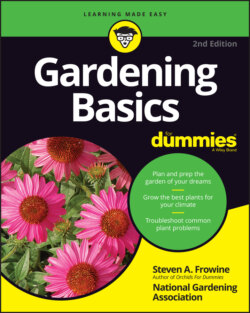Читать книгу Gardening Basics For Dummies - The Editors of the National Gardening Association, Steven A. Frowine - Страница 74
Considering different professionals
ОглавлениеHere are four choices for hiring a professional:
Landscape architects, landscape designers, and garden designers: Landscape architects, landscape designers, and garden designers are all professionals, trained in every facet of planning and realizing an outdoor plan. Their scope goes beyond regular backyard gardens or even the landscaping of an estate; many of these folks are capable of laying out a resort, college campus, public park, and so on. They can cope with topography and know how to analyze a site completely, down to its soil and light and existing vegetation. They can design walkways and decks and such in savvy and attractive ways. They can then draw up a design or several alternatives.All concerns about cost aside, hiring someone like this to do your yard is a marvelous investment. These professionals tend to notice and address elements and problems you may not have thought of; they propose appropriate and attractive solutions; and they have wide knowledge of both plant material and hardscape components. They’re the full planning package.
Landscape or general contractors: They’re the folks who are usually called in to actually install the job. They do the heavy lifting. Don’t be afraid to ask someone for help to create your vision: somebody strong enough, experienced, and knowledgeable; somebody certified, bonded, and insured as well. A reputable contractor has no problem demonstrating her qualifications. Getting help isn’t wimpy; it’s only good sense.Let someone else do the hard jobs and do them safely and correctly the first time. These folks can install all your residential hardscape needs like walks and walls. Save the fun and creative parts for yourself.
Master gardeners: A master gardener isn’t someone you hire but rather someone you can consult and consider a resource. Master gardeners have to follow a certification process. Throughout the country at Cooperative Extension Service offices (staffing and budgeting permitting, I should add), classes train avid home gardeners or anyone else who’s interested in horticulture. Candidates take a core course, often in the fall or winter when life outdoors is less busy.The hours and courses required for certification vary from office to office, state to state. Getting certified doesn’t make a person an expert; it just shows that he or she has made a commitment to learning more about and serving in the local horticultural scene.To find a master gardener, call the nearest office of the Cooperative Extension Service. You can search online or go to
https://ahsgardening.org/gardening-resources/master-gardeners/.Professional horticulturists: The term professional horticulturist is somewhat nebulous, but in general these professionals are university-trained folks with an undergraduate or graduate degree in some form of plant science, usually horticulture. They usually have a broad range of knowledge about plants. Their training is science based and includes courses on soils, chemistry, biology, botany, plant physiology, entomology, plant pathology, landscape design, as well as specific courses on various aspects of horticulture. Most of them work in professional capacities at large nurseries and greenhouses. They may or may not have a background in garden design.
